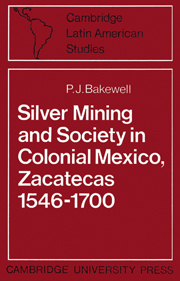Book contents
- Frontmatter
- Contents
- List of tables
- List of illustrations
- Acknowledgements
- Abbreviations and conventions
- Dedication
- The Setting
- 1 Discovery and Settlement
- 2 Consolidation and Expansion
- 3 The City
- 4 Supplies and Distribution
- 5 Corregidor and Cabildo
- 6 The Circumstances of Mining
- 7 Mercury
- 8 The Production of Silver
- 9 Conclusion: Plus Ultra
- Tables
- Graphs
- Plans
- Appendix I
- Appendix II
- Glossary: some common mining, and related, terms
- On primary sources
- Select bibliography
- Index
- Plate section
- Frontmatter
- Contents
- List of tables
- List of illustrations
- Acknowledgements
- Abbreviations and conventions
- Dedication
- The Setting
- 1 Discovery and Settlement
- 2 Consolidation and Expansion
- 3 The City
- 4 Supplies and Distribution
- 5 Corregidor and Cabildo
- 6 The Circumstances of Mining
- 7 Mercury
- 8 The Production of Silver
- 9 Conclusion: Plus Ultra
- Tables
- Graphs
- Plans
- Appendix I
- Appendix II
- Glossary: some common mining, and related, terms
- On primary sources
- Select bibliography
- Index
- Plate section
Summary
In 1609 the second Viceroy Luis de Velasco, now an old and sober man in his second term of office in New Spain, began a letter to a councillor of the Indies thus: ‘It is indeed as your worship judges it, that the most important business that exists today in the Indies is the matter of quicksilver, for it is their principal support . ..’. And some fifty years before, when Viceroy Enríquez in September 1572 had placed the distribution of mercury in New Spain under Crown control, he reported some reactions to his reform to the king. The friars, he said, had objected, ‘saying that to prohibit [free traffic in] mercury and to place it under monopoly (estanco) is like placing a monopoly on bread or meat, for it is understood that the sustenance (sustento) of this land depends on the mines of silver, and they cannot be maintained without mercury . . .’. These were typical comments, of which thousand-fold repetition can be found in Spanish colonial documents of the sixteenth and seventeenth centuries. And given the current equation, for all practical purposes unchallenged, of bullion and wealth, it was natural that comments of this sort should be constantly made. For where there was no chance of refining silver ores by smelting, because they were not rich enough or were otherwise unsuitable, mining depended entirely on mercury. No mercury meant no silver. No silver meant that the motive force was removed from the economy of the colonies.
- Type
- Chapter
- Information
- Publisher: Cambridge University PressPrint publication year: 1971



